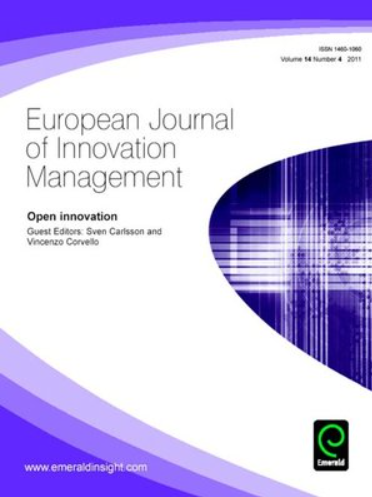How to drive business model innovation for food and beverage enterprises after the pandemic: evidence from an emerging economy
IF 5.7
3区 管理学
Q1 BUSINESS
引用次数: 0
Abstract
Purpose This study's main goal is to explore how small and medium-sized enterprises (SMEs) in the food as well as beverage (F&B) area should evolve to survive in a bustled post-pandemic future. Design/methodology/approach Drawing on the knowledge-practice gap in the field of Entrepreneurial Orientation (EO) as well as Business Model Innovation (BMI), this study examines an integrated framework using the F&B sector as an empirical field of research. This study uses an empirical quantitative approach using the main information aggregated from a questionnaire administered during the study. The sample had 467 valid responses (71.08% response rate). This paper uses the Partial-Least Squares Structural Equation Model (PLS-SEM) to examine structural relationships because this technique is usually proposed for models with complex relations. Findings According to the research EO is directly and indirectly, correlated with BMI. The correlation is positive and significant. Simultaneously, corporate social responsibility (CSR) is partially mediated in the stated relation between EO as well as BMI, and CETA where it shows a positive moderation part in EO's influence on CSR. In particular, it elucidates how EO promotes CSR and BMI, alongside moderating part of circular economy principles adoption (CEPA). Practical implications These research findings suggest that SMEs in the F&B sector should transform the way they traditionally manage their businesses by applying circular economic principles into entrepreneurial orientation to promote CSR-based practices and acquire the resources obtained from internal and external stakeholders. Hence, their business can recover from post-pandemic effects and become resilient to future disruptions. Furthermore, this study suggests that adopting circular economy principles provides a key source of knowledge and insights that allows firms to sharpen their entrepreneurial orientation toward incorporating stakeholders and social environmental concerns into business models for sustainability, especially in the uncertain and drastic changing environment. Originality/value This study proposes a novel approach by which BMI is formed and evolved based on circular economy principles-oriented entrepreneurship and the synergies of stakeholders through undertaking corporate social responsibility practices. Drawing from the knowledge-practice gap, this research adds to the existing knowledge about EO as well as BMI with a conceptualized and operationalized empirical framework in a novel context that was not covered in current literature, especially in the context of uncertainties and disruptions experienced during COVID-19 outbreaks. The F&B sector was hit and how it should evolve to recover and build resilience is perceived as an urgent issue.疫情后食品饮料企业如何推动商业模式创新:来自新兴经济体的证据
本研究的主要目标是探讨食品和饮料(F&B)领域的中小型企业(SMEs)应该如何发展,以便在繁忙的大流行后的未来中生存。利用创业导向(EO)和商业模式创新(BMI)领域的知识与实践差距,本研究利用餐饮行业作为实证研究领域,考察了一个综合框架。本研究采用实证定量的方法,使用从研究期间管理的问卷中汇总的主要信息。有效问卷467份,应答率71.08%。本文使用偏最小二乘结构方程模型(PLS-SEM)来检验结构关系,因为这种技术通常用于具有复杂关系的模型。研究结果表明,情商与BMI有直接或间接的关系。相关性为显著正相关。同时,企业社会责任在企业绩效与BMI、CETA之间的关系中起到部分中介作用,在企业绩效对企业社会责任的影响中表现出正向调节作用。特别是,它阐明了EO如何促进企业社会责任和BMI,同时调节部分循环经济原则的采用(CEPA)。这些研究结果表明,餐饮行业的中小企业应该改变传统的企业管理方式,将循环经济原则应用于创业导向,以促进基于企业社会责任的实践,并从内部和外部利益相关者那里获取资源。因此,他们的业务可以从大流行后的影响中恢复过来,并能够适应未来的中断。此外,本研究表明,采用循环经济原则提供了知识和见解的关键来源,使公司能够提高其创业取向,将利益相关者和社会环境问题纳入可持续发展的商业模式,特别是在不确定和急剧变化的环境中。创新/价值本研究提出了一种基于循环经济原则导向的企业家精神和通过承担企业社会责任实践的利益相关者的协同效应来形成和发展BMI的新方法。根据知识与实践的差距,本研究在当前文献未涵盖的新背景下,特别是在COVID-19爆发期间经历的不确定性和中断的背景下,通过概念化和可操作的经验框架,增加了关于EO和BMI的现有知识。餐饮行业受到了冲击,该行业应如何发展以恢复和增强韧性,被视为一个紧迫的问题。
本文章由计算机程序翻译,如有差异,请以英文原文为准。
求助全文
约1分钟内获得全文
求助全文
来源期刊
CiteScore
10.40
自引率
17.60%
发文量
107
期刊介绍:
The subject of innovation is receiving increased interest both from companies because of their increased awareness of the impact of innovation in determining market success and also from the research community. Academics are increasingly beginning to place innovation as a priority area in their research agenda. This impetus has been partly fuelled by the Economic & Social Research Council (ESRC) who have designated innovation as one of nine research areas in their research initiative schemes.

 求助内容:
求助内容: 应助结果提醒方式:
应助结果提醒方式:


